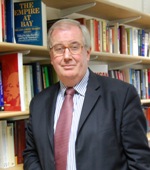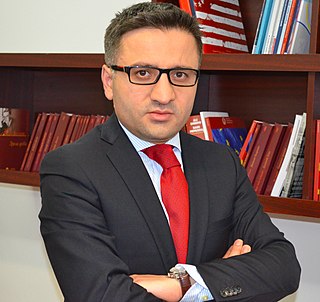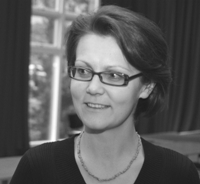
The European Union (EU) is a supranational political and economic union of 27 member states that are located primarily in Europe. The union has a total area of 4,233,255 km2 (1,634,469 sq mi) and an estimated total population of over 448 million. The EU has often been described as a sui generis political entity combining the characteristics of both a federation and a confederation.

A think tank, or policy institute, is a research institute that performs research and advocacy concerning topics such as social policy, political strategy, economics, military, technology, and culture. Most think tanks are non-governmental organizations, but some are semi-autonomous agencies within government, and some are associated with particular political parties, businesses or the military. Think tanks are often funded by individual donations, with many also accepting government grants.

The Euro-Atlantic Partnership Council (EAPC) is a post–Cold War, North Atlantic Treaty Organization (NATO) institution. The EAPC is a multilateral forum created to improve relations between NATO and non-NATO countries in Europe and Central Asia. States meet to cooperate and discuss political and security issues. It was formed on 29 May 1997 at a Ministers’ meeting held in Sintra, Portugal, as the successor to the North Atlantic Cooperation Council (NACC), which was created in 1991.
The European Social Forum (ESF) was a recurring conference held by members of the alter-globalization movement. In the first few years after it started in 2002 the conference was held every year, but later it became biannual due to difficulties with finding host countries. The conference was last held in 2010. It aims to allow social movements, trade unions, NGOs, refugees, peace and anti-imperial groups, anti-racist movements, environmental movements, networks of the excluded and community campaigns from Europe and the world to come together and discuss themes linked to major European and global issues, in order to coordinate campaigns, share ideas and refine organizing strategies. It emerged from the World Social Forum and follows its Charter of Principles.
European integration is the process of industrial, economic, political, legal, social, and cultural integration of states wholly or partially in Europe or nearby. European integration has primarily come about through the European Union and its policies.
Ordoliberalism is the German variant of economic liberalism that emphasizes the need for government to ensure that the free market produces results close to its theoretical potential but does not advocate for a welfare state.

The European Union Institute for Security Studies (EUISS) is a Paris-based agency of the European Union (EU) within the realm of Common Foreign and Security Policy (CFSP). The EUISS is an autonomous agency with full intellectual freedom and researches security issues of relevance for the EU and provides a forum for debate. In its capacity as an EU agency, it also offers analyses and forecasting to the High Representative for Foreign Affairs and Security Policy, Josep Borrell.

Professor Bill Durodié is a Professor of Politics, Languages and International Studies at the University of Bath, UK, as well as a former head of department there.

Pan-European identity is the sense of personal identification with Europe, in a cultural or political sense. The concept is discussed in the context of European integration, historically in connection with hypothetical proposals, but since the formation of the European Union (EU) in the 1990s increasingly with regard to the project of ever-increasing federalisation of the EU. The model of a "pan-European" union is the Carolingian Empire, which first defined "Europe" as a cultural entity as the areas ruled by the Roman Catholic Church, later known as "Medieval Western Christendom". The original proposal for a Paneuropean Union was made in 1922 by Count Richard von Coudenhove-Kalergi, who defined the term "pan-European" as referring to this historical sense of the western and central parts of continental Europe encompassing the cultures that evolved from medieval Western Christendom instead of the modern geographic definition of the continent of Europe. Coudenhove-Kalergi saw the pan-European state as a future "fifth great power", in explicit opposition to the Soviet Union, "Asia", Great Britain and the United States.

Michael E. Cox is a British academic and international relations scholar. He is currently Emeritus Professor of International Relations at the London School of Economics (LSE) and Director of LSE IDEAS. He also teaches for the TRIUM Global Executive MBA Program, an alliance of NYU Stern and the London School of Economics and HEC School of Management.

The European University Institute (EUI) is an international postgraduate and post-doctoral teaching and research institute and an independent body of the European Union with juridical personality, established by the member states to contribute to cultural and scientific development in the social sciences, in a European perspective. EUI is designated as an international organisation. It is located in the hills above Florence in Fiesole, Italy. In 2021, EUI's School of Transnational Governance, with its graduate and executive programmes, moved to the Casino Mediceo di San Marco, which is a late-Renaissance or Mannerist style palace in the historic centre of Florence.
Stephen Michael Alan Haseler was a British academic and advocate for a British Republic. He was a Professor of Government, author of many books on contemporary politics and economics.
EuroScience was founded in 1997 for the support and promotion of science and technology in Europe. EuroScience is a membership-based non-profit association to foster open debate about science and create networks in research and innovation. Its members include anyone interested in European research, whether professional scientists, policy-makers, industries or members of the public.

The Union for the Mediterranean is an intergovernmental organization of 43 member states from Europe and the Mediterranean Basin: the 27 EU member states and 16 Mediterranean partner countries from North Africa, Western Asia and Southern Europe. It was founded on 13 July 2008 at the Paris Summit for the Mediterranean, with an aim of reinforcing the Euro-Mediterranean Partnership (Euromed) that was set up in 1995 as the Barcelona Process. Its general secretariat is located in Barcelona, Catalonia, Spain.
Wainer Lusoli is an Italian academic, trained as a political scientist and policy analyst. He has worked on policy areas including science policy, open science, science in society, political participation, electronic democracy, digital identity, social computing and cloud computing.

Fatmir Besimi is a Macedonian politician and economist of Albanian ethnicity. He currently served for Minister of Finance in North Macedonia, He also served twice as Minister of Economy then Minister of Defence and after that he was Deputy Prime Minister of the Government of the Republic of Macedonia in charge of European Affairs. In 2010 he was selected as one of the top European Ministers in the group of Young Global Leaders by World Economic Forum.

Elena Korosteleva is a dissident academic researcher and principal investigator focusing on governance, democratisation, complexity and resilience. She is Professor of Politics and Global Sustainable Development and Director of the Institute for Global Sustainable Development at the University of Warwick and is visiting professor at the Oxford Belarus Observatory at the Oxford University.

Raffaele Marchetti is an Italian political scientist and editorialist.

Monika Panayotova is a Doctor of Political Science, with interests in the field of the EU security and defence policy. Bulgarian politician – Monika Panayotova has been appointed as Deputy Minister for the Bulgarian Presidency of the Council of the EU 2018, responsible for the relations with the European Parliament during the Bulgaria's presidency since June 28, 2017.
Trinità dei Monti is a think tank headquartered in Rome, Italy. Established by Pierluigi Testa and 50 other founding members in February 2012, it operates as a discussion group that gathers at the Spanish Steps in Rome. Trinità dei Monti focuses in economics, financial markets, banking, as well as Italian and European politics. Participants in the discussions comprise representatives from public authorities, banks, private companies, and universities.












